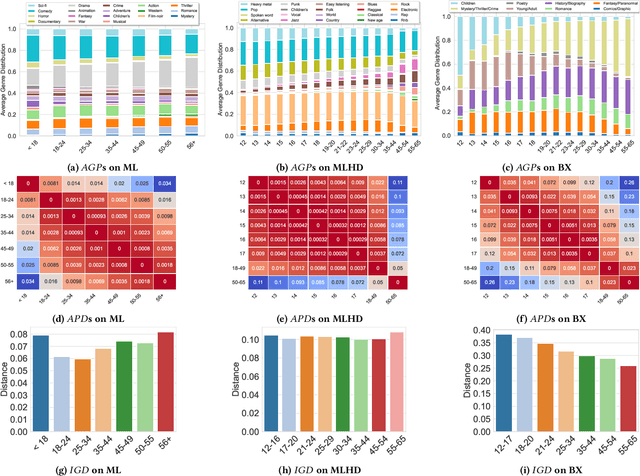Robin Ungruh
Impacts of Mainstream-Driven Algorithms on Recommendations for Children Across Domains: A Reproducibility Study
Jul 09, 2025



Abstract:Children are often exposed to items curated by recommendation algorithms. Yet, research seldom considers children as a user group, and when it does, it is anchored on datasets where children are underrepresented, risking overlooking their interests, favoring those of the majority, i.e., mainstream users. Recently, Ungruh et al. demonstrated that children's consumption patterns and preferences differ from those of mainstream users, resulting in inconsistent recommendation algorithm performance and behavior for this user group. These findings, however, are based on two datasets with a limited child user sample. We reproduce and replicate this study on a wider range of datasets in the movie, music, and book domains, uncovering interaction patterns and aspects of child-recommender interactions consistent across domains, as well as those specific to some user samples in the data. We also extend insights from the original study with popularity bias metrics, given the interpretation of results from the original study. With this reproduction and extension, we uncover consumption patterns and differences between age groups stemming from intrinsic differences between children and others, and those unique to specific datasets or domains.
Ah, that's the great puzzle: On the Quest of a Holistic Understanding of the Harms of Recommender Systems on Children
May 03, 2024Abstract:Children come across various media items online, many of which are selected by recommender systems (RS) primarily designed for adults. The specific nature of the content selected by RS to display on online platforms used by children - although not necessarily targeting them as a user base - remains largely unknown. This raises questions about whether such content is appropriate given children's vulnerable stages of development and the potential risks to their well-being. In this position paper, we reflect on the relationship between RS and children, emphasizing the possible adverse effects of the content this user group might be exposed to online. As a step towards fostering safer interactions for children in online environments, we advocate for researchers, practitioners, and policymakers to undertake a more comprehensive examination of the impact of RS on children - one focused on harms. This would result in a more holistic understanding that could inform the design and deployment of strategies that would better suit children's needs and preferences while actively mitigating the potential harm posed by RS; acknowledging that identifying and addressing these harms is complex and multifaceted.
* 7 pages, 2 figures, DCDW 2024
 Add to Chrome
Add to Chrome Add to Firefox
Add to Firefox Add to Edge
Add to Edge